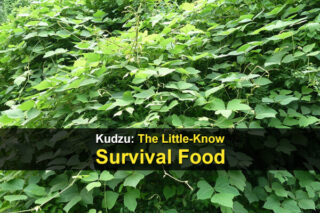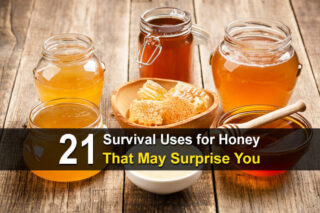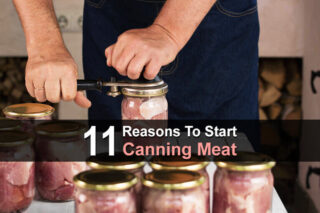Estimated reading time: 6 minutes

Even the most careful prepper or homesteader can end up with a little bit of food waste. With a bit of creativity, expired food or food that is no longer palatable or edible can be repurposed into something useful.
Keep reading for these tips on how to repurpose expired food.
Want to save this post for later? Click Here to Pin It On Pinterest!
1. Apple Peels
If you have a dirty pan that just won’t get clean, try simmering some apple peels in it to soften stubborn stuck-on food. Once it has cooled, wash and rinse thoroughly.
2. Banana Peels
Banana peels can be used to polish shoes and silver. You can run them over your teeth to whiten them, and of course, you can compost banana peels. They also make a yummy treat for pet goats!
3. Brown Bananas
If your bananas are too brown to be appetizing, don’t worry. Peel and freeze them to put into smoothies or make homemade banana bread or flourless pancakes. Feed them to your chickens and goats or compost them for use as fertilizer.
4. Citrus Peels
Citrus, especially lemon, makes a great cleaner. Grind the peels in your garbage disposal to make it smell better. You can rub a cut-up lemon on your stainless steel to clean it.
5. Cucumber Peels
Cucumber is a treat for your skin. Add leftover peels to bathwater or rub them on your skin to soothe and refresh it.
6. Expired Eggs
If your eggs are past the expiration date, don’t toss them. Scramble them up and feed them to your chickens for extra calcium. You can use the shells as fertilizer. Bake the shells and grind them to add calcium to your hens’ diets.
Or carefully open the top and use the mostly-intact eggshells as containers to start your spring vegetable plants. Then, when the seedlings are ready to plant, just lightly crack the eggshell and plant the whole thing into your garden.
7. Freezer-Burned Meat
Freezer burn does not automatically make food unsafe, but it can affect the flavor and texture, making it unappealing. If that’s the case, cook it up and feed it to your pets as DIY pet food.
8. Mayonnaise
You can’t eat old mayo without the risk of food poisoning, but you can use it to polish your stainless steel. Use a clean cloth to apply a little mayo and buff it for a nice shine.
9. Meat Bones
You don’t have to toss those leftover meat bones. Simmer them to make bone stock to use as a base for soup. If you have chickens, you can let the chickens clean the leftover bits of meat off the bones, but be careful not to allow cats, dogs, or other animals to ingest the bones.
10. Peanut Butter
Old peanut butter has plenty of uses, so don’t be afraid to keep it around if it’s a little bit rancid. Peanut butter makes an appealing bait for mouse traps, removes gum, and makes hair conditioner.
11. Rancid Vegetable Oil
If your veggie oil has gone south, don’t toss it out. Use it to lubricate hinges and tools or turn it into lamp oil. You can also use it to polish furniture if you don’t mind the odor.
12. Rotten Tomatoes
If your tomatoes go bad before you can eat them, flush them! Make sure they are chopped up or soft enough to flush. The enzymes in rotten tomatoes can improve the function of your septic system.
13. Sour Milk
If your milk smells sour, you don’t have to dump it. You can use it in recipes that call for sour milk, pour it in the toilet to clean your septic tank, and soak your silverware to make them clean. It can be used as a deer repellent in the garden and fertilizer.
14. Sprouted Potatoes
We all know we shouldn’t eat sprouted or green potatoes, but what should you do with them? Plant them! Plant your sprouting potatoes and grow a whole new potato plant.
15. Sprouted Sweet Potatoes
Unlike white potatoes, sprouted sweet potatoes are edible. You can stir-fry the sprouts or just cook them alongside the sweet potatoes. If this doesn’t sound appetizing, plant them! You can grow another harvest of sweet potatoes or grow them for their edible leaves.
16. Stale Bread
It’s easy for bread to go stale. If your bread gets a little dried out, make it into a new recipe. You can make croutons, breadcrumbs, French toast casserole, bread pudding, and strata from bread that’s a little bit stale. If your loaf of bread is too far gone for people, your animals might enjoy it. You can feed stale bread to chickens and goats in moderation.
17. Stale Cereal
Cereal that has lost its crunch isn’t delicious, but you can crush it up and use it in place of breadcrumbs in many recipes. If you’ve got kids, they can use them for fun craft projects for improving their fine motor skills. Have them string Fruit Loops and Cheerios with yarn, match shapes and colors, or glue them on paper to make a pretty picture.
18. Stale Pretzels
No one wants to eat stale pretzels, but you can quickly revive them. Spread them out on a cookie sheet and bake in a 350˚ F oven for 10 minutes. Once cooled, your snacks will be crunchy again. This method also works with stale crackers. Alternatively, crush them in a baggie with a rolling pin and use them in place of breadcrumbs in dishes such as meatloaf.
19. Used Coffee Grounds
It’s a no-brainer to compost your old coffee grounds, but what else can you do with them? Use them as a body scrub (once they’re cooled, of course), scour pots and pans, and repair scratches in furniture.
20. Vegetable and Fruit Scraps
Any other vegetable scraps can be fed to your chickens, goats, and sometimes, rabbits. Veggie scraps are great food for worm bins, or they can be composted for next season’s garden.
21. Vegetable Ends
Celery hearts, romaine hearts, and onion tops can be grown again. Stick them in water until they begin to grow roots and then plant in soil. Your celery and romaine should grow into new plants. The onions, however, will only grow tops, which you can use to flavor dishes.
22. Wilted Vegetables
If your vegetables got a little wilty, don’t give up on them just yet! Try soaking them in cold water and see if they don’t revive. If that doesn’t work, you can simmer them to make vegetable stock.
Like this post? Don't Forget to Pin It On Pinterest!










